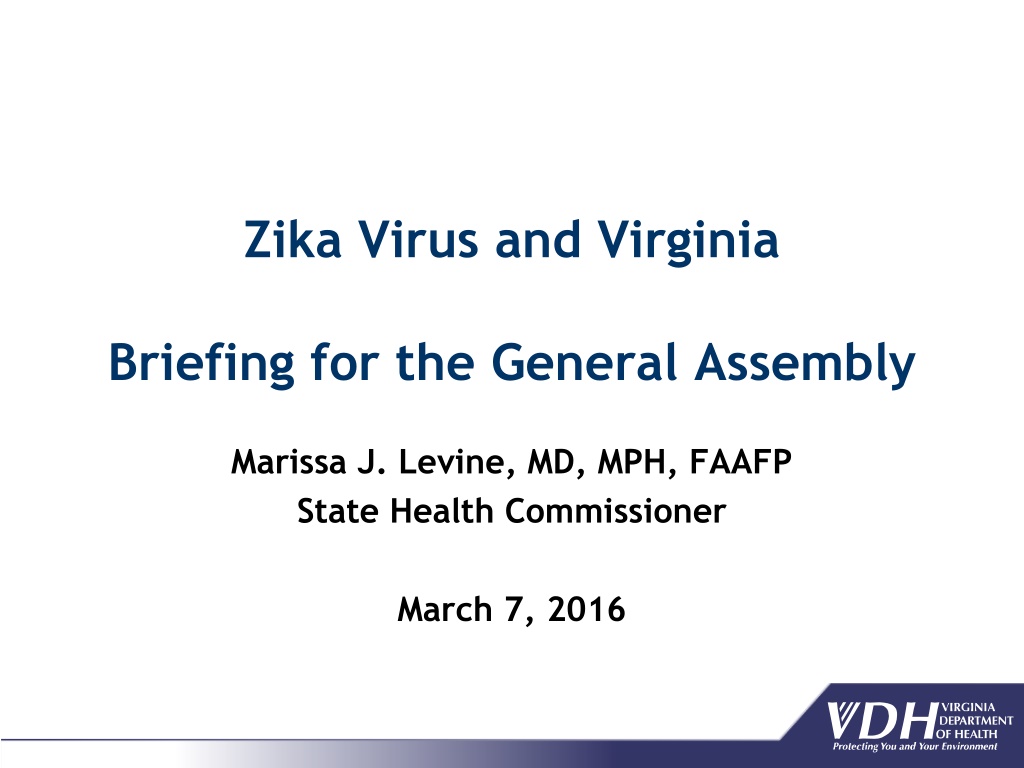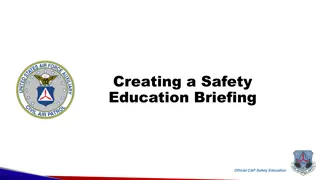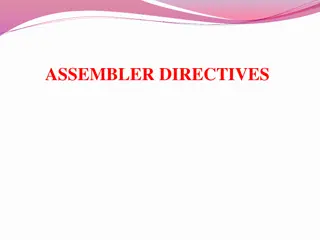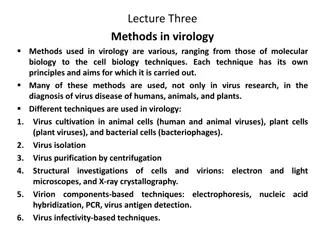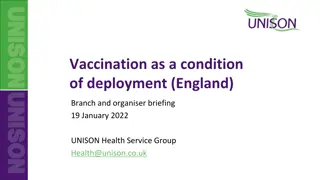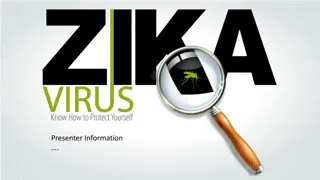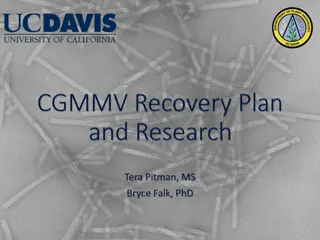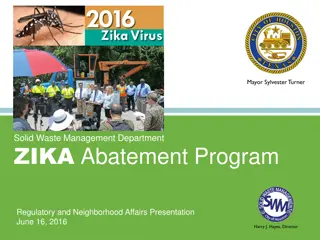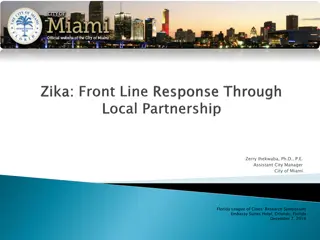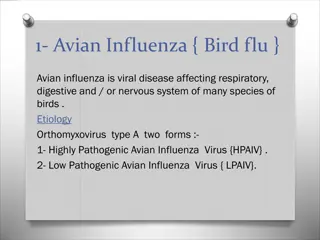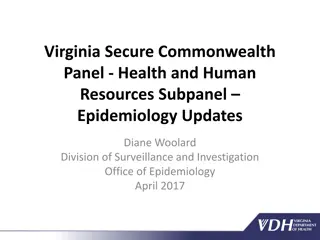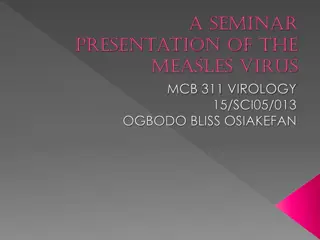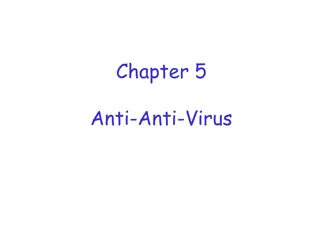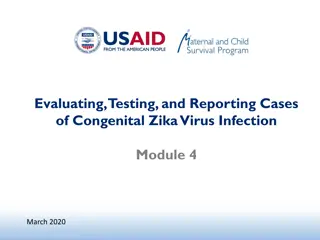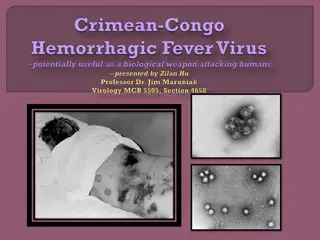Understanding Zika Virus: Briefing for the General Assembly - Virginia
Zika Virus and Virginia Briefing for the General Assembly highlights the basics of the disease, its spread, the 2015-2016 outbreak in the Americas, populations at risk, cases in Virginia, and transmission methods. It emphasizes the need for prevention, awareness, and vigilance in affected areas.
Download Presentation

Please find below an Image/Link to download the presentation.
The content on the website is provided AS IS for your information and personal use only. It may not be sold, licensed, or shared on other websites without obtaining consent from the author. Download presentation by click this link. If you encounter any issues during the download, it is possible that the publisher has removed the file from their server.
E N D
Presentation Transcript
Zika Virus and Virginia Briefing for the General Assembly Marissa J. Levine, MD, MPH, FAAFP State Health Commissioner March 7, 2016
Outline The Basics: Zika Virus Disease Epidemiology Transmission Special circumstances Prevention Travel related Mosquito Control State Actions VDH Zika Task Force
Zika Virus Disease The Basics Spread to people primarily through bite of infected mosquitoes (Aedes species) 1 of 5 infected persons get sick Fever, rash, joint pain and conjunctivitis are most common symptoms usually a mild illness Illness lasts several days to 1 week No vaccine or medications are available to prevent or treat Zika infections
20152016 Outbreak in Americas 1stcase of locally-spread Zika virus disease in Brazil confirmed in May 2015 Since then, outbreaks occurring in many countries Number of cases among travelers visiting or returning to US will increase *Maps were developed by CDC using currently available information as of February 2, 2016
Populations at Risk for Zika Infection Current Anyone living in or traveling to area with active transmission, including pregnant women Potential During mosquito season, parts of US, including Virginia, have mosquitoes that could spread virus if they bite an infected person
Zika Virus Disease in Virginia As of March 3, 2016, VDH has reported five (5) cases of Zika virus disease in adult residents of Virginia to the Centers for Disease Control and Prevention (CDC) All are travel associated Additional cases will be reported as healthcare providers evaluate ill returning travelers, consider Zika, and work with public health to obtain testing
Transmission Zika virus primarily transmitted by: Mainly Aedes aegypti (Yellow fever mosquito) Also by Aedes albopictus (Asian tiger mosquito) Both also transmit dengue and chikungunya viruses Both circulate in VA, especially the Asian tiger mosquito CDC Public Health Image Library Mosquitoes become infected by feeding on infected persons Zika virus remains in an infected person s blood for about one (1) week
Transmission Transmitted from mother to child, during pregnancy or at the time of delivery Sexual transmission Rarely, transmitted by blood Spread through blood transfusion has been reported Food and Drug Administration (FDA) has recommended deferral of blood donation from individuals who were recent travelers to Zika- affected areas
Special Concerns for Pregnant Women and Zika There have been reports of microcephaly (smaller than normal head size) and other poor pregnancy outcomes in babies of mothers who were infected with Zika virus while pregnant Link between Zika infection and these outcomes is not understood fully, but is under investigation
Special Concerns for Pregnant Women and Zika At this time, CDC advises that pregnant women avoid travel to Zika-affected countries If travel unavoidable, protect against mosquito bites No evidence that, after the virus is cleared from the body, Zika virus affects future pregnancies
Zika Prevention Strategies: Travel On January 15, 2016, CDC issued travel alert for people traveling to regions where transmission is ongoing Until more is known, CDC recommends special precautions for pregnant women and women trying to become pregnant Pregnant women in any trimester should consider postponing travel to affected area Women trying to become pregnant should consult with healthcare provider before traveling to affected area
Zika Prevention Strategies: Avoid Mosquito Bites All travelers, especially pregnant women, should take steps to avoid mosquito bites Choose an EPA-registered insect repellant and use according to product label http://www.epa.gov/insect-repellents/find-insect- repellent-right-you Use permethrin-treated clothing Cover exposed skin by wearing long sleeves, pants, and hats Sleep indoors in rooms with screened windows or air- conditioning, or use bed net if sleep in room exposed to outdoors
Zika Prevention Strategies: Sexual Transmission Until we know more: Men who reside in or have traveled to an area of active Zika virus transmission who have a pregnant partner should abstain from sexual activity or consistently and correctly use condoms during sex with their pregnant partner for the duration of the pregnancy Recommendations will be revised as more information becomes available
Mosquito Control & Surveillance in Virginia Mosquito control in Virginia - locally funded and limited to some densely populated counties and cities: Most efforts focus on surveillance and control of nuisance mosquitoes and mosquitoes that transmit West Nile or Eastern Equine Encephalitis viruses Asian tiger mosquito control methods require house- to-house inspections and treatments
VDHs Initial Response Coordinate with public and private partners Raise awareness among clinicians and general public https://www.vdh.virginia.gov/epidemiology/Zika/ Expand lab testing capability at State Lab: DCLS DCLS currently facilitates testing at CDC DCLS expects to get Zika virus lab testing
VDHs Initial Response Conduct disease surveillance All suspected and confirmed cases are required to be reported to local health department Local health departments can provide consultation and facilitate lab testing if needed Lab testing is focused on pregnant women who traveled to affected area; other suspect cases may be tested if testing criteria are met VDH and DCLS are pursuing funding opportunities to enhance mosquito surveillance and preparedness
Virginias Coordinated Preparation and Response Initial briefings Interagency February 4 Cabinet February 8 Local emergency managers/health directors February 10 Governor s direction: Establish Statewide Zika Task Force Led by VDH Commissioner Inaugural Task Force Meeting February 26
Task Force Members Deputy Chief of Staff, Office of the Governor Department of Emergency Management Department of Health Department of Health Professionals Department of Behavioral Health & Developmental Services Department of Agriculture and Consumer Services Department of Environmental Quality Department of General Services - Division of Consolidated Laboratory Services Department of Conservation and Recreation Department of Game and Inland Fisheries Virginia Hospital and Healthcare Association / 6 regional coalitions Medical Society of Virginia City, Town and County Governments Virginia Municipal League Virginia Association of Counties American Red Cross and Virginia Blood Services Others, situationally dependent, as required
Task Force Activities Agreed on action plan & milestones Defined agency & organization roles Established task groups Mosquito Control Blood Supply Security External Communications Established requirements for sharing/reporting Overall situational awareness Task assignments & tracking Next meeting week of March 14
Action Plan & Milestones Item Due Date 3/31/16 Assignee Complete Draft VDH Zika Human and Mosquito Surveillance and Investigation Plans VDH Office of Epidemiology Establish Zika Mosquito Control Task Group 3/4/16 Mosquito Control Association; Lead Complete Draft Mosquito Mitigation Plan 3/24/16 Mosquito Control Task Group Establish Blood Supply Security Task Group 3/4/16 American Red Cross & Virginia Blood Services, Lead Blood Supply Security Task Group Complete Draft Blood Supply Security Plan 3/24/16 Establish External Communications Task Group 3/4/16 VDH Communications, Lead Complete Draft Communications Plan 3/24/16 External Communications Task Group Validate TF Member Agency Roles and Responsibilities 3/4/16 VDH Emergency Preparedness Develop/Publish Situational Awareness Battle Rhythm (SitReps, Leadership Briefs, TF Meeting Schedule) 2/26/16 VDH Emergency Preparedness Develop Pre-scripted Zika Messaging 3/24/16 Communications Task Group Complete State Zika Plan 3/31/16 VDH Emergency Preparedness Develop Zika Exercise-in-a-Box for use at local, regional, state levels 3/31/16 VDH Training
Potential Funding Sources Refocused CDC Ebola Funding Reorientation of state-allocated Ebola support funding State sum-sufficient funding
What Your Constituents Can Do Pay attention to travel advisories regarding Zika- affected areas CDC Travelers Health Page http://wwwnc.cdc.gov/Travel If traveling to Zika-affected areas, take steps to avoid mosquito bites
What to do (continued) When mosquito season begins in Virginia Take steps to avoid mosquito bites Stop mosquitoes from living and multiplying around home or business Drain standing water from all containers Discard containers that can hold water Empty and clean birdbaths and pet water bowls once or twice a week Follow us on Twitter! @VDHgov @VDHCommissioner
Zika Information & Resources http://www.vdh.virginia.gov/ https://www.vdh.virginia.gov/clinicians/ https://www.vdh.virginia.gov/epidemiology/zika/index.htm http://wwwnc.cdc.gov/travel/notices http://www.cdc.gov/zika/geo/united-states.html
Thank You! Questions?
